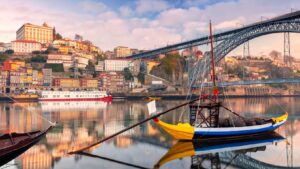Embarking on a solo journey to Portugal offers an unparalleled opportunity to immerse oneself in a tapestry of rich history, vibrant culture, and breathtaking landscapes. This sun-drenched country, nestled on the edge of the Iberian Peninsula, beckons travelers with its charming cobblestone streets, stunning coastal views, and warm, welcoming locals. Solo travel in Portugal is not just a journey through picturesque locales; it’s an invitation to discover oneself amidst the allure of ancient cities and serene countryside.
Portugal Solo Travel
Why Portugal Is Ideal for Solo Travelers
Portugal stands out as an ideal destination for solo travelers, offering a blend of safety, accessibility, and rich experiences that cater to individual explorers. Its reputation for warm hospitality makes it easy for solo travelers to feel at home, navigating through its cities and countryside with ease. The country’s compact size and efficient public transport system allow for smooth travel between locations, making it convenient for those journeying alone.
 Solo travelers in Portugal can immerse themselves in a tapestry of experiences, from the historical streets of Lisbon and Porto to the serene beauty of the Algarve’s beaches. The diversity of landscapes and cultures within close proximity means every day can unveil a new adventure. Besides, Portugal’s thriving social scene, from cafes and restaurants to galleries and live music venues, provides ample opportunities to meet locals and fellow travelers, making it easy to forge new friendships.
Solo travelers in Portugal can immerse themselves in a tapestry of experiences, from the historical streets of Lisbon and Porto to the serene beauty of the Algarve’s beaches. The diversity of landscapes and cultures within close proximity means every day can unveil a new adventure. Besides, Portugal’s thriving social scene, from cafes and restaurants to galleries and live music venues, provides ample opportunities to meet locals and fellow travelers, making it easy to forge new friendships.
Safety is a top priority for solo travelers, and Portugal consistently ranks as one of the safest countries in the world. Its low crime rate and the general sense of security in both urban and rural areas mean travelers can explore with confidence, whether strolling through city streets at night or hiking in secluded natural parks.
Planning Your Solo Adventure
When embarking on Portugal solo travel, preparing adequately ensures a memorable experience. Portugal’s tourism infrastructure caters well to solo adventurers, from its comprehensive public transport system connecting major cities like Lisbon and Porto to lesser-known gems, to a plethora of accommodation options suited for every budget and taste. Solo travelers can choose from hostels situated in bustling city centers, offering a chance to meet fellow travelers, to quaint guesthouses that promise a tranquil retreat.
Mapping out an itinerary that blends Portugal’s rich historical sites with its natural landscapes is essential. The country boasts a variety of attractions, including the UNESCO World Heritage sites in Belém, the fairy-tale-like palaces of Sintra, and the sun-kissed beaches of the Algarve. Adventurers should also make time for Portugal’s vibrant markets, cozy cafes, and dynamic cultural scene to fully immerse in the local lifestyle.
Staying Safe on Your Solo Journey
 Safety stands paramount for solo travelers exploring Portugal. The country’s reputation for hospitality extends to its emphasis on traveler safety. Navigating Portugal’s cities and countryside alone is generally safe, but adopting certain safety measures can enhance the solo travel experience. Keeping in touch with someone about travel plans, staying aware of one’s surroundings, and having local emergency numbers on hand are essential tips. Additionally, using Portugal’s efficient public transport system during the day and opting for reputable taxi services at night can help solo travelers move safely across different locations. Embracing these safety practices ensures a secure and enjoyable solo journey through Portugal.
Safety stands paramount for solo travelers exploring Portugal. The country’s reputation for hospitality extends to its emphasis on traveler safety. Navigating Portugal’s cities and countryside alone is generally safe, but adopting certain safety measures can enhance the solo travel experience. Keeping in touch with someone about travel plans, staying aware of one’s surroundings, and having local emergency numbers on hand are essential tips. Additionally, using Portugal’s efficient public transport system during the day and opting for reputable taxi services at night can help solo travelers move safely across different locations. Embracing these safety practices ensures a secure and enjoyable solo journey through Portugal.
Making the Most of Portuguese Culture
Exploring Portuguese culture enriches portugal solo travel experiences, connecting travelers to the country’s vibrant traditions and welcoming communities. Engaging in local festivals offers insight into Portugal’s diverse cultural tapestry, from the colorful streets of Lisbon during the Santo Antonio Festival to the historical Porto celebrating Sao Joao. Sampling traditional dishes, such as bacalhau (codfish) or pastéis de nata (custard tarts), in local markets or family-owned restaurants, introduces solo travelers to Portugal’s rich culinary heritage. Participating in workshops or classes, solo travelers can learn about Portugal’s traditional crafts, including azulejos (ceramic tiles) painting or cork product making, fostering a deeper connection with the country’s artistic heritage. By embracing these activities, solo travelers immerse themselves in Portuguese culture, making their journey through Portugal both memorable and meaningful.

